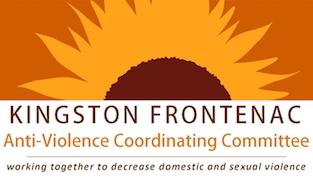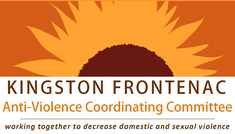KFACC is made up of members from the law enforcement and justice, shelter and housing, health, mental health and counselling support sectors. Membership is open to organizations working in some capacity with victims and survivors of partner abuse and/or sexual violence and their families, to agencies working with perpetrators and to like minded community members.
The Administrative Group meets regularly to coordinate, monitor and oversee the ongoing implementation of KFACC’s mandate and specific projects. All KFACC expenditures and budgets are managed by the Administrative Group and the Administrative Group develops and submits funding proposals, and provides approval to proposals prepared by other KFACC members, subcommittees or working groups, prior to submission. Further, the Administrative Group oversees the preparation and submission of progress and evaluation reports to funding bodies.
The strategy and groundwork laid out during KFACC meetings is often moved forward at the subcommittee level. Currently, we have three standing subcommittees:
The Strategic Plan Workgroup is a group brought together to work through the five pillars of our Strategic Plan and oversee work on the KFACC Community Engagement Project. This project will focus on developing a new service model for the delivery of services to survivors of sexual assault and partner abuse in KFL&A; “one stop” collaborative service delivery sites (CSDS).
The Workgroup will develop onboarding documents to introduce community groups to the CSDS and promote the CSDS into the community at large. This will maintain the sustainability of the CSDS long term as we need to engage with those who do not have an active voice at the table, find out what their needs are and ensure that knowledge is used in the development of services offered by the CSDS. This will help build an inclusive community partnership.
The end goal is to have survivors be able to access a wide variety of acute/crisis intervention services, practical supports, short and long term supportive counselling services from the agencies in a secure online communication portal and, long term, in a single, centrally-located site.
At present, survivors are often required to visit many different agencies locations in order to get the support and services they need, and despite our best efforts they continue to “fall through the cracks”.
The Strategic Plan Workgroup now also monitor, evaluate, review and revise our Partner Abuse Protocol and Sexual Assault Protocol.
The Education, Advocacy and Communication Workgroup meets to provide education on timely topics as well as to provide advocacy for vulnerable populations. This is accomplished by education meetings and training sessions shared to the community and agencies. They are mandated, on behalf of the KFACC Administrative Group to address the need for a collaborative approach to educating the public on issues pertaining to sexual assault and or partner abuse and advocating for social change.
The Diversity Workgroup meets to serve as an advisory on topics regarding diverse subjects, to the larger membership and to strategize community outreach to ensure diversity and accessibility at KFACC. These diverse subjects include, but not limited to:
- Youth
- Newcomers to Kingston, those identified as immigrants or refugees
- Those living with a DisAbility
- Those part of the LGBTQ2sIA community
- Those who identify as part of the BIPOC community
- Those who identify as Indigenous
The Administrative Group oversees all subcommittee work, and all committees, permanent and ad hoc, are accountable to the entire KFACC membership.

